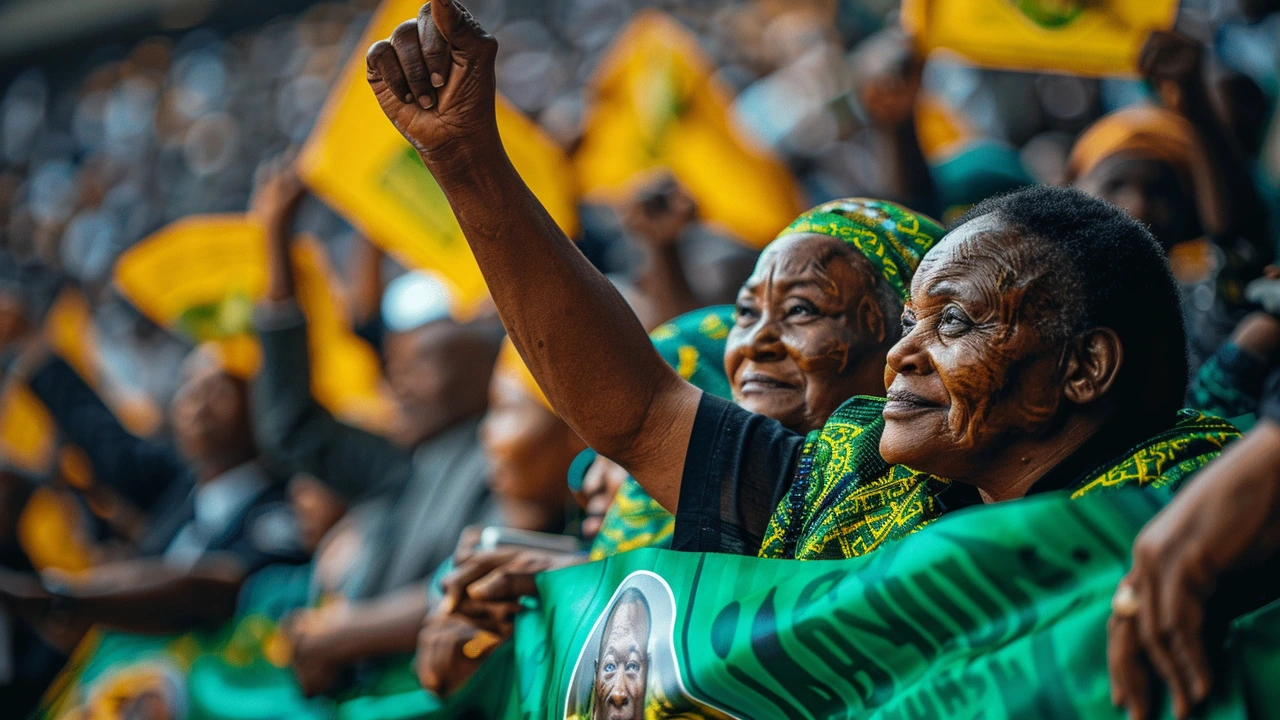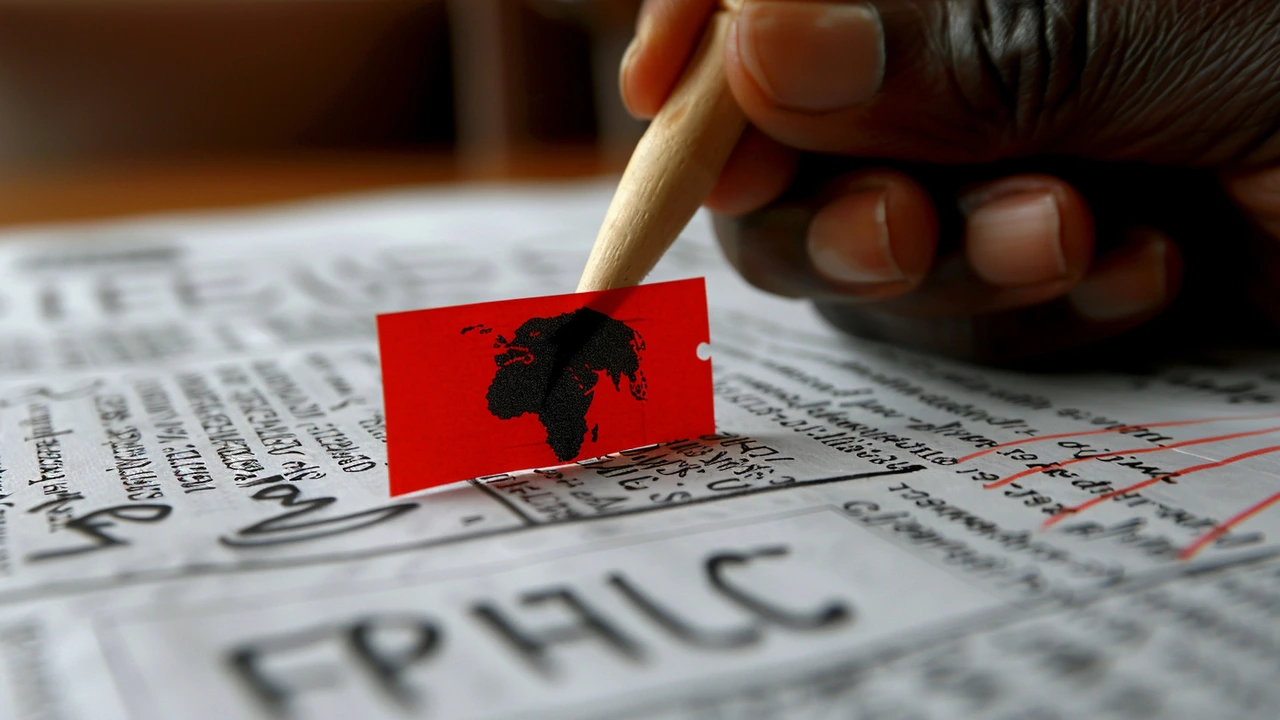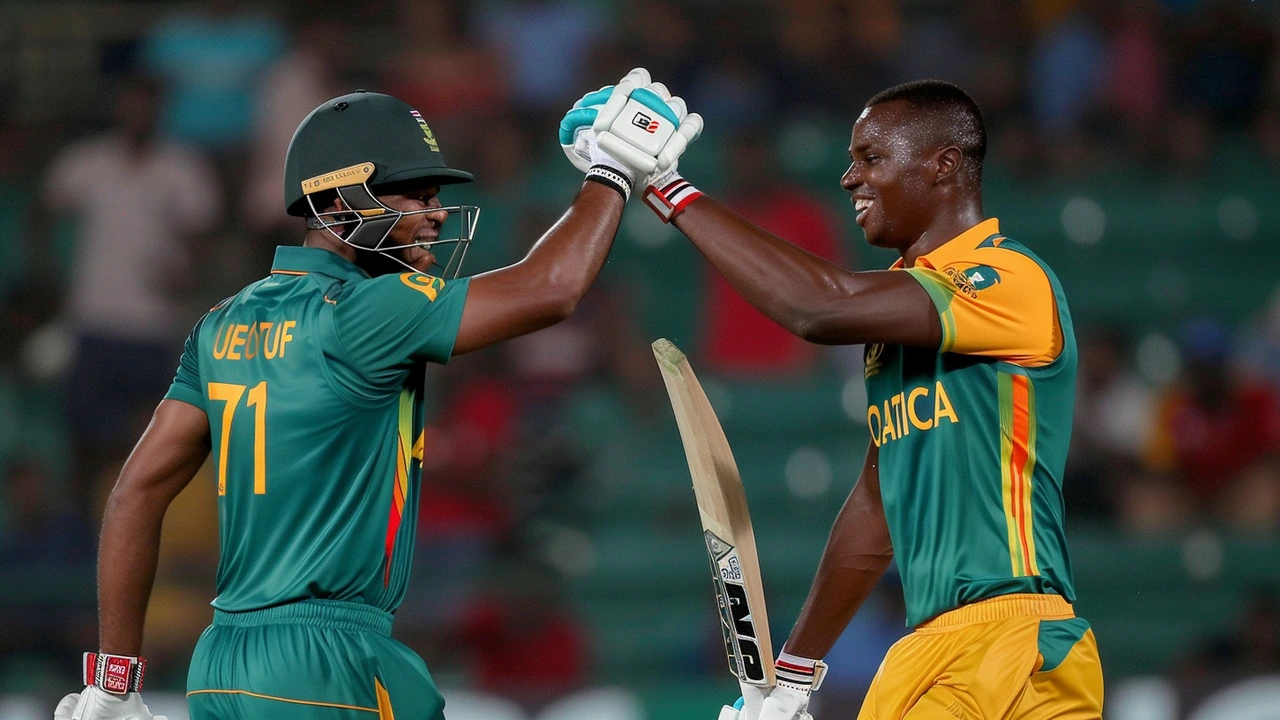ANC Rally Seeks to Reignite Support Amid Mounting Challenges
The African National Congress (ANC), South Africa's ruling party, held its final campaign rally at Johannesburg's FNB stadium, drawing tens of thousands of supporters adorned in the party's signature yellow T-shirts. The event, aptly named 'Siyanqoba,' translating to 'We are Winning,' was a last-ditch effort to demonstrate the ANC's enduring strength and unity ahead of the impending general election. The party, once revered as the liberator of South Africa from apartheid, now stands on the precipice of what many predict could be its worst electoral performance in history.
The atmosphere at the rally was electrifying, with a sea of yellow flooding the stadium as attendees sang and chanted slogans in support of the ANC. This vibrant display of loyalty, however, belied an undercurrent of frustration and disappointment felt by many. President Cyril Ramaphosa's address was met with mixed reactions as he emphasized the necessity of continuing the ANC's journey towards a brighter future for South Africa. His message aimed to reassure the populace that under ANC leadership, the nation would overcome current adversities and emerge stronger.
Economic Troubles and Corruption Scandals
South Africa's economic landscape has been marred by a series of challenges that have severely affected the ANC's reputation. Burdensome corruption scandals have plagued the party, eroding public trust and casting a long shadow over its achievements. The infamous 'state capture' saga, in particular, has left an indelible stain on the ANC, with many citizens doubting the sincerity of the party's commitment to good governance. Economic stagnation, high unemployment rates, and rising crime have further compounded the party's woes, creating a sense of disillusionment among both the electorate and longstanding supporters.
Unemployment, especially among the youth, stands at a staggering rate, leading to widespread dissatisfaction and unrest. The economic policies that were once credited for the country's growth have now been critiqued for not evolving to meet contemporary challenges. The ANC's economic strategies, deemed by some as inadequate, have not quelled the fears of a populace seeking stability and prosperity. This economic discontent has translated into skepticism about the party's ability to lead the nation effectively into the future.
Ramaphosa's Leadership Under Scrutiny
Cyril Ramaphosa, a figure who once inspired hope as a pragmatic and business-savvy leader, now finds himself under intense scrutiny. Critics within and outside the ANC argue that his leadership has leaned excessively towards pro-business policies at the expense of the average South African. His perceived detachment from grassroots issues has led some to believe that he is out of touch with the daily struggles faced by many citizens. The rally at FNB stadium mirrored this ideological divide, with a section of the crowd proudly affirming their loyalty to the party's historical legacy, while another faction expressed their discontent vocally.
Ramaphosa's tenure has been marked by efforts to clean up the government and restore trust in the ANC. His administration has embarked on various reforms aimed at combating corruption and rejuvenating the economy. Despite these efforts, the results have been slow to materialize, and the patience of the South African people is wearing thin. The stark reality of economic hardship and persistent inequality has overshadowed the gains made, further complicating Ramaphosa's mission to rejuvenate the ANC’s image.
Achievements and Disillusionment
Despite the prevailing disillusionment, many South Africans remain grateful to the ANC for its role in ending white-minority rule and laying the foundation for a democratic society. The provisions of free education, healthcare, housing, and the creation of job opportunities are significant achievements that cannot be overlooked. These accomplishments have cemented the ANC's legacy as a champion of liberation and social justice, drawing respect and admiration from various quarters.
However, the juxtaposition of these achievements with contemporary challenges creates a complex narrative. The older generation, who vividly remember the struggles of apartheid, tend to hold the ANC in high regard. The youth, conversely, who face a different set of economic and social challenges, view the party’s accomplishments through a more critical lens. This generational divide was evident at the rally, showcasing a party at a crossroads, balancing its storied past with the urgent need to address present and future concerns.
Symbolism and International Solidarity
One notable moment during the rally was the display of a Palestinian flag, symbolizing South Africa's solidarity with the Palestinian cause. This act resonated deeply with many attendees, reflecting the country's strong stance on international human rights issues. It also highlighted the ANC's historical alignment with global liberation movements, drawing parallels between South Africa's own struggles and those faced by other oppressed peoples around the world.
South Africa’s support for Palestine remains a key aspect of its foreign policy, underscoring the nation’s commitment to advocating for human rights and justice on a global scale. This aspect of the rally served as a reminder of the values that the ANC has long stood for and continues to promote on the international stage. It reinforced the narrative that, despite internal challenges, the party remains committed to fighting for justice and equality beyond its borders.
In the coming weeks, as South Africa heads to the polls, the future of the ANC will be decided. The rally at FNB stadium was a microcosm of the broader national sentiment, illustrating both the enduring loyalty to the party and the significant challenges it faces. For the ANC, the path forward involves not only acknowledging its past achievements but also addressing the pressing issues that will determine its relevance in a rapidly changing society.



randy mcgrath
May 25, 2024 AT 21:48The rally reminds us how collective memory shapes political momentum. When a party that once fought for freedom gathers thousands in yellow, it signals both nostalgia and desperation. Voters tend to cling to symbols when the present feels uncertain. Yet symbols alone cannot solve unemployment or crime. The real question is whether the ANC can translate sentiment into concrete policy.
Frankie Mobley
May 28, 2024 AT 19:15The event at FNB Stadium was more than a show of colors; it was an attempt to rally last‑minute support before the election. Historically the ANC has drawn strength from mass mobilizations, but the current economic climate makes that strategy tougher. Youth unemployment sits above 30 % and many young South Africans are looking elsewhere for hope. Understanding this backdrop helps explain the mixed reactions to Ramaphosa’s speech. The party now faces the challenge of turning enthusiasm into actionable plans.
ashli john
May 31, 2024 AT 16:41What a vivid display of loyalty it was the sea of yellow really shows the heart of many South Africans despite the hardships. Keep believing that change can still happen you’ve got a whole nation watching. Stay hopeful and keep pushing for better policies.
Kim Chase
June 3, 2024 AT 14:08I see both the pride and the frustration among the crowd, it’s a clear sign that the ANC still matters to many. At the same time, the youth are lookin for new ideas and that’s understandable. The party should definitely listen to those concerns and adapt its approach for a more inclusive future.
David Werner
June 6, 2024 AT 11:35What most people don’t realize is that the rally was orchestrated by shadowy interests aiming to distract the public from a deeper power grab. Behind the bright yellow shirts lies a network that thrives on chaos, feeding off the very discontent they claim to resolve. The timing, the utterance of “We are Winning”, and the sudden appearance of foreign flags are all part of a larger script designed to keep voters in a perpetual state of hope while the real agenda unfolds behind closed doors.
Paul KEIL
June 9, 2024 AT 09:01The ANC’s performance metrics indicate a downward trajectory; voter attrition rates are approaching critical thresholds; strategic recalibration is non‑optional if they wish to maintain hegemonic relevance.
Horace Wormely
June 12, 2024 AT 06:28The rally illustrates the party’s lingering brand strength.
christine mae cotejo
June 15, 2024 AT 03:55The FNB Stadium gathering was a theatrical culmination of decades‑long political theatre that the ANC has been staging since the dawn of democracy.
From a sociopolitical perspective, the sea of yellow shirts functions as a visual metaphor for both collective memory and the yearning for a return to perceived stability.
However, the underlying socioeconomic data paint a starkly different picture, with youth unemployment hovering near 35 % and a crime rate that has risen steadily over the past five years.
Such macro‑economic indicators are not merely statistics; they are lived experiences that shape voter sentiment on a daily basis.
Ramaphosa’s speech attempted to bridge the gap between nostalgia and forward‑looking policy, yet the rhetoric often fell short of concrete proposals.
The inclusion of a Palestinian flag added an international solidarity dimension, reminding observers that the ANC still aligns itself with broader liberation movements.
Critics argue that this symbolism may be a strategic distraction aimed at deflecting attention from domestic governance failures.
Nonetheless, the loyalty displayed by long‑time supporters cannot be dismissed as mere nostalgia; it reflects genuine appreciation for historic achievements such as free education and land reform.
These achievements, however, are now weighed against contemporary challenges, creating a complex cost‑benefit analysis in the minds of voters.
The generational divide is evident, with older constituents recalling the sacrifices of the apartheid era, while younger voters demand tangible economic opportunities.
Political scientists warn that such a divide can lead to fragmentation within the party’s voter base if not addressed through inclusive policy design.
Furthermore, the party’s internal factions, ranging from progressive reformists to entrenched traditionalists, add another layer of complexity to campaign strategy.
The electoral calculus therefore must account for both the emotional resonance of the ANC’s legacy and the pragmatic expectations of a modern electorate.
In practical terms, this means crafting policies that target job creation, reduce crime, and improve service delivery while maintaining the moral high ground that the party historically espoused.
If the ANC succeeds in this balancing act, it may preserve its relevance; if it fails, the upcoming election could mark a watershed moment in South African political history.
Douglas Gnesda
June 18, 2024 AT 01:21From a governance analytics standpoint, the rally serves as a data point indicating residual party capital, but the KPI trend line for voter confidence is trending downward. Incorporating cross‑sectional polling data reveals that issue salience-particularly around unemployment and corruption-outweighs nostalgic brand equity. The ANC must therefore operationalize a policy matrix that integrates macroeconomic stimulus with anti‑corruption safeguards to realign its strategic assets.
Abhijit Pimpale
June 20, 2024 AT 22:48The numbers you cite are accurate; the unemployment figure is indeed above 30 % and must be tackled urgently.
Eric DE FONDAUMIERE
June 23, 2024 AT 20:15Totally agree! The party needs a fresh plan and the data you showed is spot on – we cant keep doing the same old thing and hope for different results.
Pauline Herrin
June 26, 2024 AT 17:41While the metrics presented are correct, the analysis would benefit from a more nuanced discussion of the structural constraints influencing voter behavior, rather than a purely quantitative assessment.
pradeep kumar
June 29, 2024 AT 15:08The ANC’s rhetoric is a smokescreen; real change requires more than slogans.
love monster
July 2, 2024 AT 12:35It’s clear the crowd still feels a deep connection to the party’s legacy, and that emotional bond can be a powerful catalyst for community‑driven initiatives if harnessed responsibly.
Christian Barthelt
July 5, 2024 AT 10:01Actually, the rally’s impact might be overstated; many voters are already disillusioned and will likely vote based on economic performance rather than any symbolic display.
Ify Okocha
July 8, 2024 AT 07:28The emphasis on international solidarity distracts from the core issue: the ANC’s inability to deliver sustainable economic reforms, a failure that will cost them votes regardless of any foreign policy gestures.
William Anderson
July 11, 2024 AT 04:55What a spectacular waste of resources-a parade of yellow shirts that does little but mask the party’s inertia and decline.
Sherri Gassaway
July 14, 2024 AT 02:21In the quiet after the chants, one can hear the lingering question of whether symbols can ever fully substitute for substance.